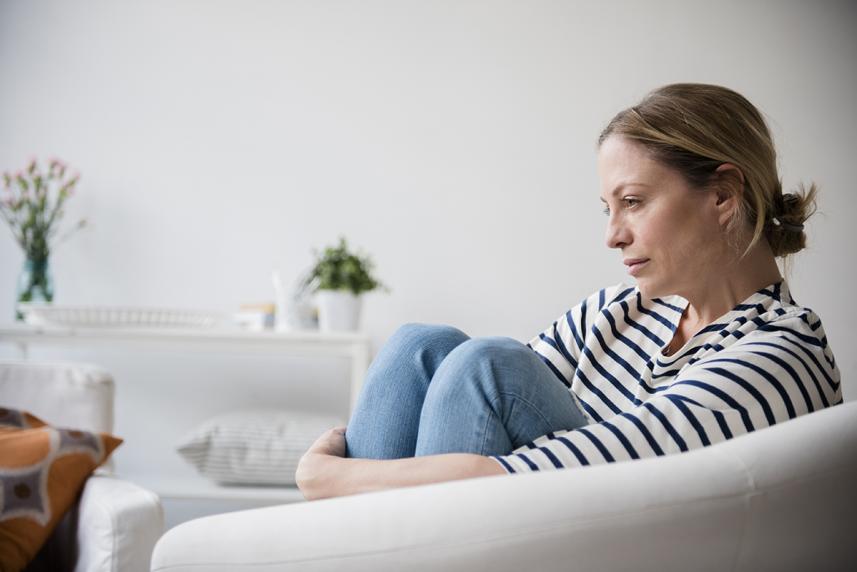
The Optum Store has a national network of virtual health professionals who can help you right from the comfort of home.

The end of a relationship brings its own type of grief. Understanding the complicated emotions you may feel can help you process the loss.
Grief is usually associated with death. But as anyone who’s gone through a devastating breakup or divorce knows, the end of a relationship or marriage can also feel like a death. And this loss brings its own kind of grief.
It’s normal to feel confused and overwhelmed by your emotions post-breakup or post-divorce. “It’s common for both parties in the relationship to feel sadness, loss and grief, even when the decision to end the relationship was not entirely mutual,” says Frank G. Anderson, MD. He’s a lead trainer and consultant for Internal Family Systems (IFS) Institute and an adviser to the International Association of Trauma Professionals (IATP).
Here, experts walk you through the feelings to expect when a relationship ends and how best to cope. Once you understand your grief, you’ll be better equipped to handle it.
When you and your partner call it quits, you may be shocked by the feelings of grief that follow. But grief is a healthy response — even if you were the person who wanted the breakup, says Asma Rehman, LPC. Rehman is a certified grief recovery specialist and therapist with the Grief Recovery Center in Houston.
Grief is, simply put, a strong emotional reaction to a loss. In addition to grief, you’ll likely feel a range of emotions, both positive and negative. “These feelings can include guilt, anger, freedom, anxiety, confusion, fear, relief and sadness,” Rehman says.
Why do we experience such a complicated set of feelings after a breakup? Because you’re not only losing a relationship. You’re really experiencing multiple losses, says Talia Litman. She’s a certified marriage and family therapist based in New York. The end of a relationship or marriage can include the loss of:
Some have described relationship grief as a sharp heartache every time you’re reminded, in small and big ways, of the loss. “When I was going through my divorce, I’d be surprised every time something triggered a new wave of sadness,” says Elizabeth Davin, who lives in Rye, NY. “My therapist at the time said the grief of divorce was like a thousand little deaths, and that really resonated.” This could be as simple as seeing your partner’s cereal in the pantry, running into a mutual friend at the store, or receiving a piece of mail with his or her name on it.

The Optum Store has a national network of virtual health professionals who can help you right from the comfort of home.
Experts have several theories about how people experience and process grief. And even though it doesn’t look the same for everyone, it can help to know what to expect.
One theory is that grief moves through 5 stages, or categories. This model, popularized by psychiatrist Elisabeth Kübler-Ross, theorizes that people may process loss by transitioning through a series of emotions and experiences. Kübler-Ross initially created this model to explain how people cope with death. But many experts agree that these stages can apply to any type of loss. Experts also agree that the stages aren’t always experienced in order or that everyone goes through them all. The stages are:
Denial: Feeling shocked or going about your life as if nothing has happened. You might look for small glimpses of hope that the relationship isn’t really over — even when it clearly is.
Anger: Feeling fury, frustration, blame and/or anxiety over the breakup. You may blame yourself, your ex, his or her new partner or even the universe. Or your rage may be free-floating.
Bargaining: Overanalyzing your relationship and what role you may have played in its end. You might try to think of ways out of the situation, as desperate or impossible as those ideas may be.
Depression: Feeling numb and hopeless. Depression can show up in many ways, but you may find yourself lacking energy and wanting to withdraw from social interactions. You may also have trouble sleeping and turn to unhealthy ways of coping, such as alcohol.
Acceptance: Coming to terms with what happened. Even though you may hold on to some sadness, you feel that you’ll be okay. You may even discover unexpected silver linings of the breakup and entertain the idea of finding someone you can be happy with again.
Many experts believe that grief doesn’t follow a set formula, however. You may bounce back and forth between different emotions, according to Litman. Or you may experience feelings that aren’t even outlined in this model. (Some experts are moving away from the 5-stages model altogether.)
You may feel positive emotions during the grief process, too. “There are many highs and lows that correspond with ending a relationship,” Dr. Anderson says. It’s normal to feel joy, relief, a sense of calm and even elation while you mourn the end of your relationship. When something ends, it can also signal the beginning of something else. This can bring a sense of hope.
Each person’s experience is unique, but researchers have discovered some general patterns. Studies by grief researcher George A. Bonanno, PhD, have found that most people are quite resilient. Bonanno is a professor of clinical psychology at Teacher’s College, Columbia University in New York City.
Bonanno’s research suggests that most people are deeply affected by grief for only a few days or weeks. Then they gradually start feeling normal again, with occasional waves of sadness.
Still, the grief process may feel a lot longer when you’re in it. “Overall, most people are surprised at how long it takes to ‘get over someone,’” Dr. Anderson says.
That said, the grief process isn’t so much about “getting over someone, but more about taking the necessary time to process the range of feelings one has, to learn something about themselves and grow from the experience,” he adds.
The most important thing is to give yourself the time and space you need to grieve all those losses. But you can find additional support as you go through your own process:
Talk with a therapist. It can be helpful to talk through your experience with a grief therapist. This person can guide you through the grief process and help you make sense of what you’re going through. “I also help clients identify and draw on their supporting resources, from friends to hobbies to spiritual practices,” Litman says.

You can choose from 3 subscription plans that are designed to meet your needs.
Additional sources
Stages of grief: Omega-Journal of Death and Dying (2017). “Cautioning Health-Care Professionals: Bereaved Persons Are Misguided Through the Stages of Grief”
Kübler-Ross stages of grief: Elisabeth Kübler-Ross Foundation (2010). "5 Stages of Grief®"
Grief and resilience: Association for Psychological Science (2020). "Remarkable Resiliency: George Bonanno on PTSD, Grief, and Depression"